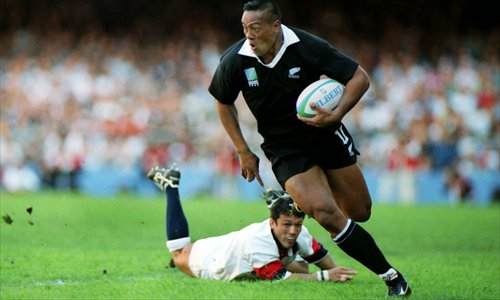Lomu changed rugby forever
Rugby’s first true global superstar dead at 40

New Zealand' Jonah Lomu runs through England's Tony Underwood on his way to scoring a try in their semifinal match at the 1995 Rugby World Cup in Cape Town, South Africa on June 18, 1995. Photo: IC
Less than three weeks after the All Blacks emerged triumphant at rugby's most successful World Cup, the sport was plunged into mourning following the untimely death of one of its favorite sons, Jonah Lomu, who passed away on Wednesday at the age of 40.
Although Lomu never managed to get his hands on the Webb Ellis Cup, no one contributed more to the tournament's ongoing ascendancy than the giant New Zealand winger, who became the sport's first truly global superstar.
Millions who had never watched or followed rugby were captivated by Lomu, a seemingly unstoppable force of nature who burst onto the international stage at the 1995 World Cup in South Africa.
New Zealand would go on to lose to the Springboks in a hard-fought final but Lomu's impact at that tournament had changed the game forever.
New template
An imposing mountain of a man with speed to burn, he single-handedly destroyed opposition defenses, scoring seven tries in the tournament and creating a template for future wingers and the need for new defensive patterns.
He scored four times in the semifinal against England, famously trampling over fullback Mike Catt for his first touchdown and every time he got the ball, the crowd rose to their feet in anticipation as he set off in full flight and swatted aside opposing players.
Then, in one of the most poignant rugby matches ever played, Lomu was thwarted by a South African team that gang-tackled him, inspired by Nelson Mandela and his vision for the new rainbow nation.
Hollywood made a movie about the Springboks' win that came just a year after the end of apartheid, entitled Invictus. Such was the universal admiration of Lomu that not even the scriptwriters could cast him as the villain to Mandela's dreams of uniting his country.
Just 20 at the time, Lomu was later able to grasp the magnitude of that historic match, acknowledging that the result meant more to the nation of South Africa than him getting a World Cup winner's medal.
For the game of rugby, Lomu's arrival could not have come at a better time. Less than two months after the final, the International Rugby Board agreed to end the sport's amateur status and embraced professionalism.
New competitions were formed and players began raking in the cash as governing bodies signed lucrative television deals and sponsorship endorsements, attracting bigger crowds to the game.
Illness arrives
Lomu was the biggest attraction of all but his health was already failing him. Before the end of 1995, the winger was diagnosed with nephrotic syndrome, a rare kidney disease.
He began receiving treatment and missed a handful of matches over the next few years but remained a formidable presence on the pitch when he was fit and returned to his best for the 1999 World Cup in Britain, Ireland and France.
For the second time in a row, he finished as the tournament's leading try scorer, running in eight touchdowns, including two in the semifinal against France at Twickenham in London.
But just as in Johannesburg four years earlier, fate conspired against Lomu and the All Blacks lost to the French in what remains one of the biggest upsets in rugby history.
Already a legendary figure in rugby, Lomu never played at the World Cup again as the disease began to worsen and threaten his life. He played his last international in 2002, ending a career in which he scored 37 tries in 63 Test appearances.
By 2003 he was undergoing dialysis for 21 hours each week and a year later he had a kidney transplant after a New Zealand radio host donated the organ to keep him alive.
By 2011, the replacement kidney stopped functioning and he was on a donor list for another but there was no sign his life was in imminent danger.
A gentle giant off the field, Lomu married three times and had two young sons.
He was in England last month with his family to see the All Blacks win the World Cup and was posting photos of himself holidaying in Dubai on his twitter feed just days ago.
Lomu's legacy to the sport of rugby went beyond his feats on the field. From humble beginnings in his native New Zealand, he inspired generations of people the world over as much with humility as his intimidating physical powers.
The rugby world is united in grieving his loss, with heartfelt tributes flooding in from all over the globe for a man who seemed invincible on the pitch but died too young.